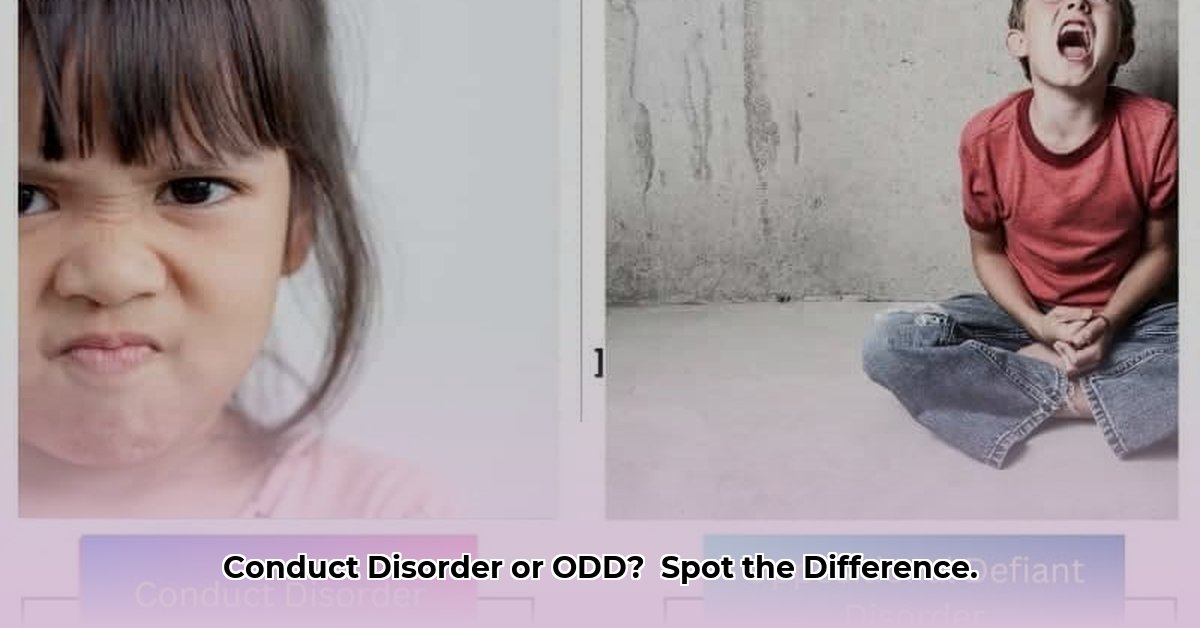This guide provides a detailed comparison of Oppositional Defiant Disorder (ODD) and Conduct Disorder (CD), two commonly misunderstood behavioral conditions affecting children and adolescents. We’ll explore the symptoms, diagnosis, treatment options, and potential long-term outcomes of each, empowering parents and caregivers with the knowledge to seek appropriate support.
Understanding ODD and CD
Dealing with persistent defiance or disruptive behavior in a child can be challenging. This section clarifies the distinctions between ODD and CD, highlighting their unique characteristics.
Decoding Oppositional Defiant Disorder (ODD)
ODD is characterized by a persistent pattern of angry moods, argumentative behavior, and vindictiveness. Children with ODD may frequently:
- Argue with adults
- Refuse to comply with rules
- Deliberately annoy others
- Blame others for their mistakes
- Be easily annoyed or angered
- Exhibit spiteful or vindictive behavior
These behaviors often disrupt family life and interactions at school. It’s important to note that occasional defiance is normal in child development. ODD, however, involves a persistent and disruptive pattern of these behaviors.
Exploring Conduct Disorder (CD)
CD represents a more severe behavioral disorder where children consistently violate the rights of others and disregard societal norms. Behaviors associated with CD include:
- Aggression towards people or animals (bullying, physical fights, cruelty)
- Destruction of property (vandalism, arson)
- Deceitfulness or theft (lying, shoplifting)
- Serious rule violations (truancy, running away)
CD actions often lead to significant consequences, including legal issues and damaged relationships. The crucial difference between ODD and CD lies in this element of harm inflicted on others or societal rules.
Comparing ODD and CD
The following chart summarizes the key differences between ODD and CD:
| Feature | Oppositional Defiant Disorder (ODD) | Conduct Disorder (CD) |
|---|---|---|
| Typical Onset | Preschool/Early Elementary Years | Adolescence (though some early signs might be present sooner) |
| Severity | Less severe, focused on defiance and disobedience | More severe, involving violations of rights and societal norms |
| Key Behaviors | Arguing, defiance, vindictiveness, refusal to comply with rules | Aggression, property destruction, deceitfulness, theft, rule violations |
| Impact | Primarily affects relationships with authority figures (parents, teachers) | Wider impact on social functioning, often leading to legal or school problems |
Diagnosing ODD and CD
Diagnosing ODD and CD requires a comprehensive evaluation by a qualified mental health professional, typically a child psychologist or psychiatrist. The process usually involves:
- Clinical Interviews: Gathering information from the child, parents, and sometimes teachers.
- Behavioral Observations: Assessing the child’s behavior in different settings.
- Questionnaires and Rating Scales: Utilizing standardized tools to assess behavior patterns.
The professional will refer to the Diagnostic and Statistical Manual of Mental Disorders, Fifth Edition (DSM-5), which outlines specific criteria for each disorder. It’s important to note that other conditions, such as ADHD or anxiety, can co-occur with ODD or CD and may need to be addressed as well.
Effective Treatment Strategies
Early intervention is crucial for both ODD and CD. Treatment plans are individualized and often involve a combination of approaches:
Parent Training Programs
- Parent Management Training (PMT): Teaches parents strategies to manage challenging behaviors, set clear expectations, and provide consistent discipline.
- Parent-Child Interaction Therapy (PCIT): Provides real-time coaching to parents during interactions with their child.
Therapy for Children
- Cognitive Behavioral Therapy (CBT): Helps children identify and change negative thought patterns and develop coping skills.
- Collaborative Problem Solving (CPS): Focuses on understanding the reasons behind the behavior and teaches problem-solving skills.
Additional Support
- Family Therapy: Addresses family dynamics and improves communication.
- Medication: May be used to manage co-occurring conditions like ADHD or anxiety.
Long-Term Outlook and Ongoing Research
While both ODD and CD present challenges, appropriate intervention can significantly improve outcomes. Early treatment can help children manage their behavior, build stronger relationships, and thrive academically and socially.
Research continues to explore the complexities of ODD and CD, including:
- Subtypes within each disorder: This may lead to more tailored treatments in the future.
- Genetic and environmental factors: Further research may reveal more about the development of these behaviors.
Finding Help and Support
If you suspect your child may have ODD or CD, seeking professional help is the first step. Consult with your pediatrician, school counselor, or local mental health organizations for referrals. Connecting with support groups can also provide valuable resources and a sense of community.
Remember, seeking help is a sign of strength, not weakness. With the right support, children with ODD or CD can learn to manage their behavior and lead fulfilling lives.
- Borosilicate Glass Containers Offer Superior Food Storage and Meal Prep - January 20, 2026
- Glass Lid Storage Containers Keep Food Fresh and Safe - January 19, 2026
- Borosilicate Glass Storage Delivers Durability and Safety for Meals - January 18, 2026










